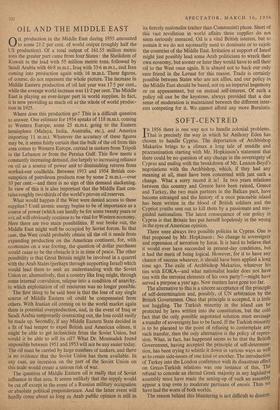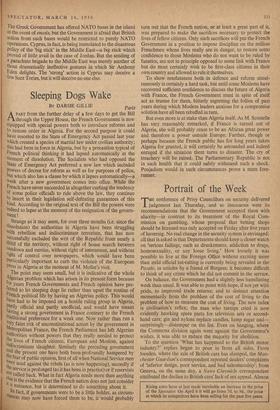SOFT-CENTRED
TN 1956 there is one way not to handle colonial problems. 'That is precisely the way in which Sir Anthony Eden has chosen to handle Cyprus. The deportation of Archbishop Makarios brings to a climax a long tale of muddle and procrastination starting with Mr. Hopkinson's statement that there could be no question of any change in the sovereignty of Cyprus and ending with the breakdown of Mr. Lennox-Boyd's negotiations with the Archbishop, which, if they had any meaning at all, must have been concerned with just such a change. What a sorry record it is! In two years relations between this country and Greece have been ruined, Greece and Turkey, the two main partners in the Balkan pact, have become estranged and the history of a once peaceable island has been written in the blood of British soldiers and the Cypriot youths sent out to kill them by a passionate and mis- guided nationalism. The latest consequence of our policy in Cyprus is that Britain has put herself hopelessly in the wrong in the eyes of American opinion.
There were always two possible policies in Cyprus. One is that proposed by Mr. Hopkinson : No change in sovereignty and repression of terrorism by force. It is hard to believe that it would ever have succeeded in present-day conditions, but it had the merit of being logical. However, for it to have any chance of success whatever, it should have been applied a long time ago. The exile of Archbishop Makarios, whatever his ties with EOKA—and what nationalist leader does not have ties with the terrorist elements of his own party?—might have served a purpose a year ago. Now matters have gone too far.
The alternative to this is a sincere acceptance of the principle of self-determination and, possibly, of UN arbitration by the British Government. Once that principle is accepted, it is little use haggling. The Turkish minority in the island can be protected by laws written into the constitution, but the cold fact that the only possible negotiated solution must envisage a transfer of sovereignty has to be faced. If the Turkish minority is to be placated to the point of refusing to contemplate any such transfer, then the only alternative is the policy of repres- sion. What, in fact, has happened seems to he that the British Government, having accepted the principle of self-determina- tion, has been trying to whittle it down in various ways as well as to create side-issues of one kind or another. The introduction of Turkey into the London conference with its disastrous effect on Greco-Turkish relations was one instance of this. The refusal to concede an elected Greek majority in any legislative assembly must have made the setting-up of such an assembly appear a trap even to moderate partisans of enosis. Thus we have had the worst of both worlds.
The reason behind this blundering is not difficult to discern. The Greek Government has offered NATO bases in the island in the event of enosis, but the Government is afraid that British action from such bases would be restricted to purely NATO operations. Cyprus. in fact, is being immolated to the disastrous policy of the 'big stick' in the Middle East—a big stick which Proved of little avail in the case of Jordan. But the sending of a parachute brigade to the Middle East was merely another of those dramatically ineffective gestures in which Sir Anthony Lden delights. The 'strong' action in Cyprus may deceive a few Suez Tories, but it will deceive no one else.



































 Previous page
Previous page